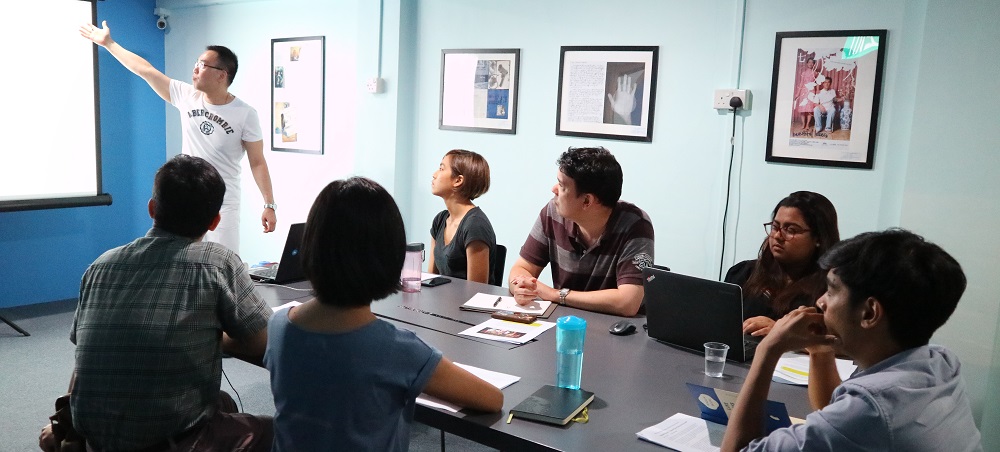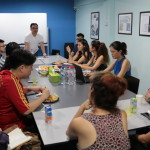
Citizens’ Reviews’ editor Robin Loon conducts a workshop for our Citizen Reviewers in June this year. Photo: Gwen Pew.
In the blink of an eye, we’re about to enter the fifth edition of Citizens’ Reviews. The programme invites aspiring theatre critics to embark on a one-year journey where they’re given tickets to watch shows, write about their experiences, and have their reviews edited and published on Centre 42’s website. It was conceived as a way to document Singapore’s ever-growing theatre landscape, as well as to provide a platform for dialogue and discourse.
“I have always believed that specialist feedback and commentary such as theatre reviews are critical for the development of a healthy theatre scene,” says Centre 42’s consultant Robin Loon, who helped conceptualise the programme in 2014 and has been serving as its English editor ever since.
But while the theatre scene has certainly come a long way in the past 50 years, the arts criticism scene has arguably grown at a slower pace. Unlike in places like the UK where there are critics like Michael Billington, who has written for The Guardian for more than 45 years, the theatre reviewers at our national papers tend to get swapped in and out every few years. It was also a great loss when one of Singapore’s longest-running independent reviewing platforms, The Flying Inkpot Theatre and Dance, closed shop in 2015, even though Centre 42 still maintains the website in its existing state as an archive for members of the public to access for research and education.
“Theatre reviewing has not quite caught up with the quality of the shows by some of the more established theatre companies in Singapore,” says Christian W. Huber, who used to be a theatre director and producer, and joined the Citizens’ Reviews programme in 2017. “Arts reviewing here primarily communicates what the show is about, and not much else.”
Jocelyn Chng – a freelance arts educator and performer who has been a Citizen Reviewer since 2016 – agrees. “The arts reviewing scene here is very disparate,” she notes. “Reviewing is not discussed often enough, and when it is, it tends to be viewed in a sceptical light.”
That is why Citizens’ Reviews aims to cultivate a pool of well-informed and articulate reviewers who can contribute to the arts criticism scene, and it does so by nurturing new voices. The pilot cycle of the programme in 2014 comprised only four reviewers, all of whom were students who took the Theatre Criticism module at the National University of Singapore (NUS), which Robin teaches. One of the reviewers who have been with us from that very first cycle – and continues to write for us now – is Isaac Tan. He used to review shows for The Kent Ridge Common, the online NUS student publication, prior to joining Citizens’ Reviews at Robin’s invitation.
“The programme has allowed me to find my voice as a critic without having to worry about very tight deadlines or readership. It has allowed me to focus solely on my writing,” he says.
Citizens’ Reviews started inviting members of the public to apply for the programme through an open call since 2015 – a process that is still in place today. For the first two years, we took on as many reviewers as we could.
“But after two cycles focusing on the ‘reviewer-on-the-street’ approach to selection, I wanted to focus more on the quality of the reviews and give Citizens’ Reviews more direction,” explains Robin. So starting with the 2017 cycle, we decided to up the requirements for the selection process, and introduced a new criteria where reviewers now have to watch at least one performance that belongs in each of the following categories during their tenure:
1) A community production that’s performed in community centres, libraries, or other communal spaces
2) A non-conventional or multidisciplinary performance
3) A production by an aspiring or semi-amateur company
4) A production by an established company
5) A play that’s performed in a different language to the one reviewers write in
While this certainly challenges our reviewers to venture outside their comfort zones, they have risen enthusiastically to the occasion, and reported that it’s been an eye-opening and rewarding experience.
“From applied theatre productions to intercultural pieces, reviewing as part of the programme has piqued my interest in forms of theatre I never knew I would enjoy, like Mandarin children’s musicals,” says Cordelia Lee, a second-year Theatre Studies and English Linguistics student at NUS who joined Citizens’ Reviews this year.
Some of these findings and thoughts will be shared with the public at a new event that we’re presenting this year, titled Living Room: Year in Reviews. Held at Centre 42 on 14 December, it will be a chance for our reviewers to gather and discuss the local plays they have watched this year, together with theatre reviewers from arts website ArtsEquator. The event will be divided into several parts, and reviewers will be invited to discuss and debate categories such as the best and most disappointing productions, performances, and design. It will not follow the format of award ceremonies and no particular productions, companies, or practitioners will be picked as the winners (or losers). Instead, these topics will serve as cues for conversation.
“I wanted to share this discussion with the public because I hope it will generate more awareness of the theatre scene in Singapore,” says Robin.
We hope that as Citizens’ Reviews keeps growing, the programme and the reviews written by our aspiring critics can also continue to serve as food for thought and discussion for audience members, readers, and the public in general. As for our reviewers, we will keep posing new challenges to them, too. “The marks of a great reviewer are wit, heart, sensitivity, being informed, and being thick-skinned,” says Robin. “For the next cycles, I am looking at perhaps assigning reviewers to focus on either a certain genre of theatre, or perhaps even track a theatre company’s work during his/her tenure.”
And for those who are up for the challenge and would like to put their skills to the test – the open call for our 2018 cycle is on-going until 22 October.
By Gwen Pew
Published on 12 October 2017
Find out more about the Citizens’ Reviews 2018 programme and apply here, and join us at Centre 42 for Living Room: Year in Reviews on 14 December 2017.





